新课标英语语法大全
新课标高中英语语法要点大全

新课标高中英语语法要点大全英语语法在学习英语的过程中扮演着重要的角色。
掌握英语语法规则不仅能够帮助我们准确地表达思想,还能够提高我们的语言能力。
本文将为您介绍新课标高中英语语法的要点,帮助您更好地学习和运用英语语法。
一、词类1. 名词(Noun)名词是用来表示人、动物、事物、地点、抽象概念等的词语。
名词有单数和复数形式,还有所有格的变化规则。
2. 代词(Pronoun)代词是用来替代名词的词语。
根据其在句子中的不同作用,代词分为人称代词、物主代词、指示代词、疑问代词等。
3. 动词(Verb)动词是表示动作、状态或存在的词语。
动词的时态、语态和情态可根据上下文来确定。
4. 形容词(Adjective)形容词是用来修饰名词或代词的词语。
形容词可以通过比较级和最高级来表示不同程度的属性。
5. 副词(Adverb)副词是用来修饰动词、形容词或其他副词的词语。
副词通常用来回答疑问词如何、何时、为何、在什么地方等。
6. 介词(Preposition)介词是用来表示位置、时间、原因等关系的词语。
介词通常用来连接名词、代词或动词与其他词语。
7. 连词(Conjunction)连词是用来连接单词、短语或句子的词语。
连词分为并列连词、从属连词和对等连词等。
8. 冠词(Article)冠词是用来限定名词的词语。
英语中的冠词有定冠词(the)和不定冠词(a/an)。
二、句子结构1. 主语和谓语主语是句子中的核心成分,谓语是主语的核心动词或者动词短语。
主语和谓语之间必须保持一致。
2. 宾语宾语是及物动词后面的补充成分,它可以是名词、代词、动名词、不定式或从句等。
3. 定语定语是修饰名词或代词的词语,用来描述或限制名词的范围。
4. 状语状语是修饰动词、形容词或其他副词的词语,用来表示动作发生的时间、地点、原因、方式等。
5. 表语表语是连接动词和名词、代词或形容词的词语,用来说明主语的状态、性质、身份等。
6. 定语从句定语从句是用来修饰名词或代词的从句。
强力推荐 新课标初中英语语法大全[原创]新目标
![强力推荐 新课标初中英语语法大全[原创]新目标](https://img.taocdn.com/s3/m/e019c1503b3567ec102d8a5a.png)
初中英语语法大全[原创]新目标语法网络图一、名词名词在句中表示所有关系的语法形式叫做名词所有格。
所有格分两种:一是名词词尾加’s构成,二是由介词of 加名词构成。
前者多表示有生命的东西,后者多表示无生命的东西。
用于无生命的东西:the legs of the chair, the cover of the book用于有生命的东西,尤其是有较长定语时:the classrooms of the first-year students 用于名词化的词:the struggle of the oppressed二、冠词冠词分为不定冠词(a, an),定冠词(the),和零冠词。
1. one, some 与any:1) one 可以泛指任何人,也可特指,复数为ones 。
some 多用于肯定句,any 多用于疑问句和否定句。
One should learn to think of others. Have you any bookmarks? No, I don’t have any bookmarks. I have some questions to ask.2) some 可用于疑问句中,表示盼望得到肯定的答复,或者表示建议,请求等。
Would you like some bananas? Could you give me some money?3) some 和any 修饰可数名词单数时,some 表示某个,any 表示任何一个。
I have read this article in some magazine. Please correct the mistakes, if any. 4) some 和数词连用表示“大约”,any 可与比较级连用表示程度。
There are some 3,000 students in this school. Do you feel any better today? 2. each 和every:each 强调个别,代表的数可以是两个或两个以上,而every 强调整体,所指的数必须是三个或三个以上。
教资新课标初中英语语法
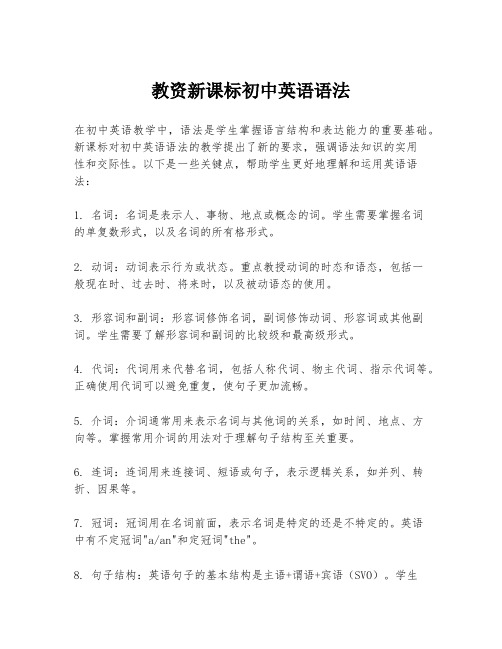
教资新课标初中英语语法在初中英语教学中,语法是学生掌握语言结构和表达能力的重要基础。
新课标对初中英语语法的教学提出了新的要求,强调语法知识的实用性和交际性。
以下是一些关键点,帮助学生更好地理解和运用英语语法:1. 名词:名词是表示人、事物、地点或概念的词。
学生需要掌握名词的单复数形式,以及名词的所有格形式。
2. 动词:动词表示行为或状态。
重点教授动词的时态和语态,包括一般现在时、过去时、将来时,以及被动语态的使用。
3. 形容词和副词:形容词修饰名词,副词修饰动词、形容词或其他副词。
学生需要了解形容词和副词的比较级和最高级形式。
4. 代词:代词用来代替名词,包括人称代词、物主代词、指示代词等。
正确使用代词可以避免重复,使句子更加流畅。
5. 介词:介词通常用来表示名词与其他词的关系,如时间、地点、方向等。
掌握常用介词的用法对于理解句子结构至关重要。
6. 连词:连词用来连接词、短语或句子,表示逻辑关系,如并列、转折、因果等。
7. 冠词:冠词用在名词前面,表示名词是特定的还是不特定的。
英语中有不定冠词"a/an"和定冠词"the"。
8. 句子结构:英语句子的基本结构是主语+谓语+宾语(SVO)。
学生需要了解不同类型的句子结构,如简单句、并列句和复合句。
9. 直接引语和间接引语:直接引语是直接引用别人的原话,而间接引语则是转述别人的话。
学生需要掌握如何从直接引语转换为间接引语。
10. 条件句:条件句用来表达在某种条件下可能发生的事情。
有零条件句、第一条件句、第二条件句和第三条件句。
11. 被动语态:被动语态强调动作的承受者而不是执行者。
学生需要学会如何将主动语态转换为被动语态。
12. 非谓语动词:非谓语动词包括动名词、不定式和分词。
它们在句子中可以作主语、宾语、定语等。
13. 疑问句:疑问句用来提问,包括一般疑问句、特殊疑问句和选择疑问句。
14. 否定句:否定句用来表达否定的意思,学生需要掌握如何构成否定句,包括部分否定和全部否定。
新课标高中英语语法要点大全

1、名词2、冠词和数词3、代词4. 形容词和副词5、动词6.动名词 7. 动词不定式8.特殊词精讲9、分词动词的语态13. 句子的种类14. 倒装15. 主谓一致16. 虚拟语气17. 名词性从句18. 定语从句 19. 状语从句21、名词名词可以分为专有名词和普通名词,专有名词是某个(些)人,地方,机构等专有的名称,如Beijing,Chin 是一个抽象概念的名词,如:book,sadness等。
普通名词又可分为下面四类:1)个体名词:表示某类人或东西中的个体,如:gun。
2)集体名词:表示若干个个体组成的集合体,如:family。
3)物质名词:表示无法分为个体的实物,如:air。
4)抽象名词:表示动作、状态、品质、感情等抽象概念,如:work。
个体名词和集体名词可以用数目来计算,称为可数名词,物质名词和抽象名词一般无法用数目计算,称为不可数以下图表示:名词专有名词不可数名词普通名词物质名词抽象名词集体名词可数名词个体名词1.1 名词复数的规则变化情况构成方法读音例词一般情况加-s 清辅音后读/s/ map-maps浊辅音和元音后读/z/ bag-bags /car-cars以s, sh, ch, x等结尾加-es 读/iz/ bus-buses/ watch-watches以ce, se, ze,等结尾加-s 读/iz/ license-licenses以辅音字母+y结尾变y 为i再加es 读/z/ baby---babies1.2 其它名词复数的规则变化1)以y结尾的专有名词,或元音字母+y 结尾的名词变复数时,直接加s变复数。
如:two Marys the Henrysmonkey---monkeys holiday---holidays2)以o 结尾的名词,变复数时:a. 加s,如:photo---photos piano---pianosradio---radios zoo---zoos;b. 加es,如:potato--potatoes tomato--tomatoesc. 上述a和b两种方法均可,如zero---zeros / zeroes。
新课标英语语法大全
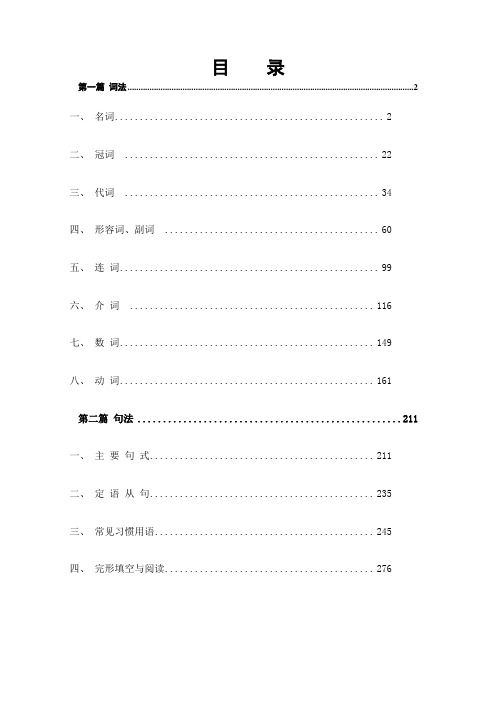
目录第一篇词法 (2)一、名词 (2)二、冠词 (22)三、代词 (34)四、形容词、副词 (60)五、连词 (99)六、介词 (116)七、数词 (149)八、动词 (161)第二篇句法 (211)一、主要句式 (211)二、定语从句 (235)三、常见习惯用语 (245)四、完形填空与阅读 (276)第一篇词法一、名词(一) 知识概要名词的概念在不同的语法教课书中有不同的解释和分类方法,但就实际应用来讲还是不要过分地追求其理论概念,而更多的要把注意力放在其应用上来。
我们不妨把它分为两大类:专有名词与普通名词。
顾名思义,专有名词是指:个人、事物、机关等所专有的名称,如,the Great Wall, America…它们是不能随意变动的。
而普通名词中则包括个体名词,如pen, worker…它表示单一的个体人或事物;集体名词,如:family,class, team,它表示的是由若干个个体组成的集合体;物质名词,如:water,paper…它表示的是一种物质,原材料;而后一种是抽象名词,如:work, time…它表示着一种在实际生活中看不见、摸不到,但却与实际生活紧密相关的某些动作、状态、品质的抽象概念。
见下表。
名词一览表种类专有名词London, John, the Communist Party of China普通名词类名词 nurse, boy, worker, pencil, dog, table集体名词 class, family, army, police, team, people物质名词 water, steel, glass, cotton, wood, sand抽象名词 happiness, love, work, life, courage, honest功用主语 My family is now in New York.表语 His father is a scientist.宾语 We love our great motherland.宾语补足语 He made London the base for his work.定语 The girls are making paper flowesrs.状语 The car cost him 1000 dollars.同位语 Mr Brown, a famous scientist, will come here.名词在使用中的难点在于名词的数,即可数名词与不可数名词的实际应用。
强力推荐 新课标初三英语语法总结
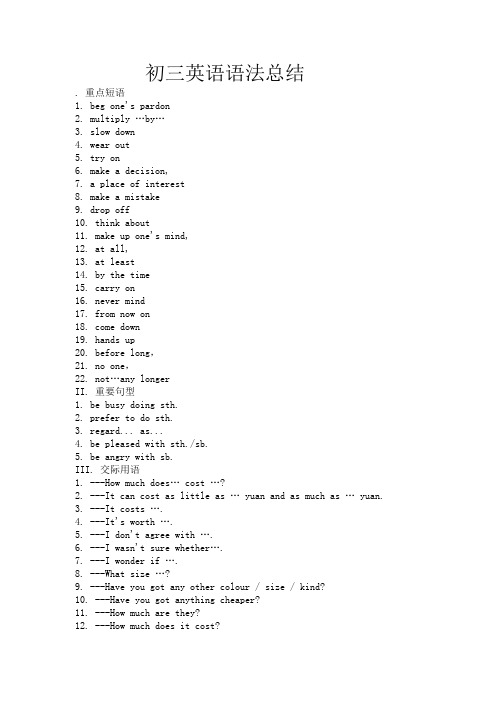
初三英语语法总结. 重点短语1. beg one's pardon2. multiply …by…3. slow down4. wear out5. try on6. make a decision,7. a place of interest8. make a mistake9. drop off10. think about11. make up one's mind,12. at all,13. at least14. by the time15. carry on16. never mind17. from now on18. come down19. hands up20. before long,21. no one,22. not…any longerII. 重要句型1. be busy doing sth.2. prefer to do sth.3. regard... as...4. be pleased with sth./sb.5. be angry with sb.III. 交际用语1. ---H ow much does… cost …?2. ---It can cost as little as … yuan and as much as … yuan.3. ---It costs ….4. ---It's worth ….5. ---I don't agree with ….6. ---I wasn't sure whether….7. ---I wonder if ….8. ---What size …?9. ---Have you got any other colour / size / kind?10. ---Have you got anything cheaper?11. ---How much are they?12. ---How much does it cost?13. ---How much is it?14. ---That's a bit expensive.15. ---Even though they're a little expensive, I'll take them.16. ---I'll think about ….17. ---I don't think I'll take ….18. ---I like ….19. ---I don't really like ….20. ---Can I help you, girl?21. ---Would you like me to look in the back?22. ---We can find ….23. ---Do you like being …?24. ---Can I ask you some questions?25. ---Sure.26. ---It was great.27. ---Wow!28. ---Yeah!29. ---Oh dear!30. ---Hands up!31. ---I’ll shoot anyone who moves.32. ---There’s no need to thank me.33. ---Can you remember anything else about him?34. ---Come down, Polly!35. ---There is a little traffic accident.36. ---There's a big traffic jam.37. ---Well, I'm sure he'll be here before long.38. ---I'm beginning to get angry with him!39.---Yes, we can't wait any longer. Let's go without him.40. ---That's terrible!41. ---That's a really bad excuse!IV. 重要语法1. 过去将来时2. 过去完成时3. 动词不定式4. 定语从句【名师讲解】1. think/ think/about/ think of(1) think 单独使用时表示"思考",接that 宾语从句时意为"认为","觉得"。
强力推荐 新课标初 中 英 语 语 法 知 识 汇 编
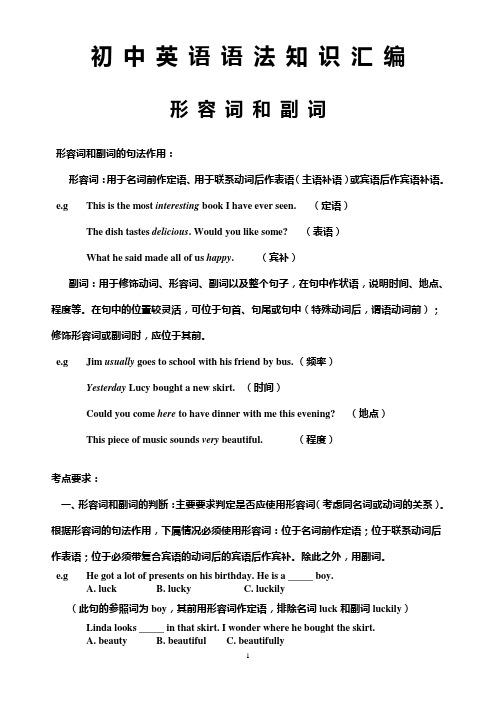
初中英语语法知识汇编形容词和副词形容词和副词的句法作用:形容词:用于名词前作定语、用于联系动词后作表语(主语补语)或宾语后作宾语补语。
e.g This is the most interesting book I have ever seen. (定语)The dish tastes delicious. Would you like some? (表语)What he said made all of us happy. (宾补)副词:用于修饰动词、形容词、副词以及整个句子,在句中作状语,说明时间、地点、程度等。
在句中的位臵较灵活,可位于句首、句尾或句中(特殊动词后,谓语动词前);修饰形容词或副词时,应位于其前。
e.g Jim usually goes to school with his friend by bus. (频率)Yesterday Lucy bought a new skirt. (时间)Could you come here to have dinner with me this evening? (地点)This piece of music sounds very beautiful. (程度)考点要求:一、形容词和副词的判断:主要要求判定是否应使用形容词(考虑同名词或动词的关系)。
根据形容词的句法作用,下属情况必须使用形容词:位于名词前作定语;位于联系动词后作表语;位于必须带复合宾语的动词后的宾语后作宾补。
除此之外,用副词。
e.g He got a lot of presents on his birthday. He is a _____ boy.A. luckB. luckyC. luckily(此句的参照词为boy,其前用形容词作定语,排除名词luck和副词luckily)Linda looks _____ in that skirt. I wonder where he bought the skirt.A. beautyB. beautifulC. beautifully(此句的参照词为look,为联系动词,其后带形容词作表语,排除A、C)What he did made his father _____.A. angryB. angrilyC. happily(此句的参照词为make,作使役动词,其后应带复合宾语,因此用形容词作宾补,排除B、C)We should do our homework _____.A. careB. carefulC. carefully(其后无名词,谓语动词不是联系动词,也不是能带复合宾语的动词,因此应用副词作状语,排除A、B)附:1、联系动词:初中英语中常见的联系动词有:be、become、look(看起来)、seem (显得)、feel(感到)、sound(听起来)、taste(尝起来)、smell(闻起来)、get(变得--- 常带比较级)、turn(变得--- 常带颜色)、keep(保持)、stay(保持)、go(处于……状况)等。
强力推荐 新课标初中英语语法总结
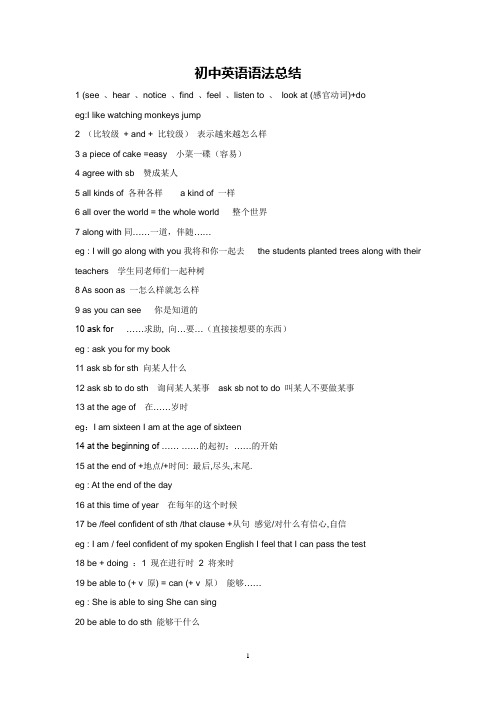
初中英语语法总结1 (see 、hear 、notice 、find 、feel 、listen to 、look at (感官动词)+doeg:I like watching monkeys jump2 (比较级+ and + 比较级)表示越来越怎么样3 a piece of cake =easy 小菜一碟(容易)4 agree with sb 赞成某人5 all kinds of 各种各样 a kind of 一样6 all over the world = the whole world 整个世界7 along with同……一道,伴随……eg : I will go along with you我将和你一起去the students planted trees along with their teachers 学生同老师们一起种树8 As soon as 一怎么样就怎么样9 as you can see 你是知道的10 ask for ……求助, 向…要…(直接接想要的东西)eg : ask you for my book11 ask sb for sth 向某人什么12 ask sb to do sth 询问某人某事ask sb not to do 叫某人不要做某事13 at the age of 在……岁时eg:I am sixteen I am at the age of sixteen14 at the beginning of …… ……的起初;……的开始15 at the end of +地点/+时间: 最后,尽头,末尾.eg : At the end of the day16 at this time of year 在每年的这个时候17 be /feel confident of sth /that clause +从句感觉/对什么有信心,自信eg : I am / feel confident of my spoken English I feel that I can pass the test18 be + doing :1 现在进行时2 将来时19 be able to (+ v 原) = can (+ v 原)能够……eg : She is able to sing She can sing20 be able to do sth 能够干什么eg :she is able to sing21 be afraid to do (of sth 恐惧,害怕……eg : I'm afraed to go out at night I'm afraid of dog22 be allowed to do 被允许做什么eg: I'm allowed to watch TV 我被允许看电视I should be allowed to watch TV 我应该被允许看电视23 be angry with sb 生某人的气eg : Don't be angry with me24 be angry with(at) sb for doing sth 为什么而生某人的气25 be as…原级…as 和什么一样eg : She is as tall as me 她和我一样高26 be ashamed to27 be away from 远离28 be away from 从……离开29 be bad for 对什么有害eg : Reading books in the sun is bad for your eyes 在太阳下看书对你的眼睛不好30 be born 出生于31 be busy doing sth 忙于做什么事be busy with sth 忙于……32 be careful 当心;小心33 be different from…… 和什么不一样34 be famous for 以……著名35 be friendly to sb 对某人友好36 be from = come from 来自eg :He is from Bejing He comes from Bejing Is he from Bejing ? Does he come from Bejing ?37 be full of 装满……的be filled with 充满eg: the glass is full of water the glass is filled with water38 be glad+to+do/从句39 be going to + v(原)将来时40 be good at(+doing) = do well in 在某方面善长, 善于……41 be good for 对什么有好处eg : Reading aloud is good for your English42 be happy to do 很高兴做某事43 be helpful to sb 对某人有好处eg : Reading aloud is helpful to you 大声朗读对你有好处Exercising is helpful to your bady 锻炼对你的身体有好处44 be in good health 身体健康45 be in trouble 处于困难中eg : She is in trouble They are in tronble 46 be interested in 对某方面感兴趣47 be late for = come late to 迟到eg: Be late for class 上课迟到48 be like 像…… eg : I'm like my mother49 be mad at 生某人的气50 be made from 由……制成(制成以后看不见原材料)51 be made of 由……制成(制成以后还看得见原材料)52 be not sure 表不确定53 be on a visit to 参观54 be popular with sb 受某人欢迎55 be quiet 安静56 be short for 表**的缩写eg: 陶is short for 陶俊杰57 be sick in bed 生病在床58 be sorry to do sth be sorry for sbeg : I am sorry for you59 be sorry to hear that60 be sorry to trouble sbeg : I am sorry to trouble you61 be strict in doing sth 严于做某事eg : He's strict in obeying noles62 be strict with sb 对某人要求严格eg: Some students are not strict with them selves 这些学生对自己不严格63 be strict with sb in sth 某方面对某人严格64 be supposed to do 被要求干什么65 be sure 表确定66 be sure of doing sth 对做某事有信心eg: He is sure of winning I am sure of learning English well67 be sure of sth 对做某事有信心eg: I'm sure of my head (my teacher 我相信我的大脑(老师)68 be sure that sth 对做某事有信心eg: I'm suer that he can pass the test 我相信他能通过考试69 be sure to do sth一定会做某事eg: We are sure to pass the test 我们一定会通过这次考试We are sure to learn English well 我们一定能学好英语70 be terrified of + 名/动doing 害怕……71 be terrified to do sth 害怕做某事72 be the same as … 和什么一样73 be used to doing sth 习惯做某事eg: My father is used to getting up early 我爸爸习惯早He is used to sleeping in class 他习惯上课睡觉74 be worth doing 值得做什么75 be(feel) afraid to do sth 害怕做某事be afraid of sth 害怕某物be afraid that 从句76 because+句子because of +短语eg : He was late because he had a headache He was late because of his headache77 begin to do = start to do 开始做某事start…with…=begin…with… 以什么开始什么eg : Let's begin the game with the song I begin to go home78 between…and… 两者之间79 borrow sth from sb 向……借……lend sth to sb ( lend sb sth 借给……什么东西eg : I borrowed a pen from him he lent a pen to me ( he lent me a pen80 both = the same(as) = not different(from) 表相同81 bother 打扰(bother sb to do sth)eg : I'm sorry to bother you ,but can you tell me to way to the station 我十分道歉打扰你,但是你能告诉我怎么去车站the problem has been bothering me for weeks 这个问题困扰了我几个周了He's bothering me to lend him money82 by the end of 到……为止83 call sb stheg : We call him old wang84 care 关心eg : Don't you care about this country's future ?你为什么不关心国家的未来85 catch up with sb 赶上某人86 chat with sb 和某人闲谈take sb to + 地点带某人去某地87 come in 进88 come over to 过来89 come up with 提出eg: Can you come up with a good idea 你能想出一个好办法吗?90 communicate with sb 和某人交流91 consider + doing 考虑做什么eg : Why not consider going to lu zhou 为什么不考虑去泸州?92 dance to 随着……跳舞eg : She likes dancing to the music 她喜欢随着音乐跳舞93 decide to do sth 决定做某事94 do a survey of 做某方面的调查95 do better in 在……方面做得更好96 do wrong 做错97 Don't forget to do sth 不要忘了做某事98 Don't mind +doing /从句/名词不要介意……99 each +名(单)每一个…eg : Each student has many books 每一个学生都有一些书100 end up +doing 以……结束101 enjoy +doing喜欢102 escape from 从……逃跑eg: The prisoners have escaped from the prison犯人从监狱里逃跑出来103 expect to do sth 期待做某事104 fall down 摔下来fall off 从哪摔下来105 fall in love with sb /sth 爱上什么106 far from 离某地远eg : The school is far from my home107 find +it +adj +to do 发现做某事怎么样108 find sb/sth +adj 发现什么怎么样eg : I find the book interesting109 finish 完成+doing(名词)110 fit to sb = be fit for sb 适合某人111 forget to do 没有做而忘了forget doing 做了而又忘了eg: Don't forget to go home I forget closing door112 from…to… 从某某到某某eg: From me to her113 get /have sth down 做完,被(别人)做…eg: I have my hair cut 我理了发(头发被剪了)Tom got his bad tooth pulled out 汤母把他的坏牙拔掉了(被牙医拔掉了)114 get a part-time job= find a part-time job115 get along well with sb = get on well with sb 与某人相处得好116 get along with sb = get on with sb 与某人相处117 get ready for = be ready for为什么而准备eg : I get ready for math I am ready for math118 get sb in to trouble 给某人麻119 get sb to do sth120 get…from… 从某处得到某物121 give a talk 做报告eg: He is give a tall122 give sth to sb give sb sth 给某人某物123 go fish 钓鱼go swimming 游泳124 go on to do 去做下一件事go on doing 继续做这件事125 go out away from go out of126 go to school 上学(用于专业的)go to the school 去学校(不一定是上学)127 good way to 好方法128 hate to do 讨厌没做过的事hate doing 讨厌做过的事129 have a party for sb 举办谁的晚会130 have a talk 听报告谈一谈131 have been doing 现在完成进行时eg : You have been talking You have been sleeping since132 have been to …( 地方)……去过某过地方have gone to …(地方)去了某地还没回来133 have fun +doing 玩得高兴134 have sth to do 有什么事要做eg: I have a lot of homework to do 我有很多家庭作业要做I have nothing to do 我没什么事情做135 have to do sth 必须做某事136 have trouble (problem) (in) doing sth 做什么事情有麻烦137 have…time +doing138 have…(时间)…off 放……假eg: I have month off 我请一个月得假139 hear sb +do/doing 听见某人做某事/正在做某事140 help a lot 很大用处141 help sb with sth \one's sth 帮助某人某事(某方面)help sb (to) do sth 帮助某人做某事142 hope to do sth 希望做某事143 How about(+doing) = What about(+doing)144 how do you like = what do you think of 你对什么的看法145 if : 是否=wethereg: I don't know if (wether) I should go to the party 我不知道我是否应该去参加晚会He don't know if (wether) we will arrive on time tomorrow morning 他不知道我们明天早上是否能准时到达146 if :如果,假如(全部接一般时态)+条件语态从句eg: I'll go to LuZhou if it does't rain 假如明天不下雨,我就去泸州If they change the plan they will let me know 假如他们要改变计划,他们会让我知道的I'll go to England ,if I have enough money next year 如果我明年由足够的钱,我就要去英国147 in one's opinion = sb think 某人认为148 in some ways 在某些方面149 in the end = finally(adv) 最后150 in the north of… 什么在什么的北方(north 北sowth 南west 西east 东)151 in the sun 在太阳下152 increase 增加eg : They've increased the prece of petrol by 3% 他们把石油价增加了3%153 instead of +(名)代替eg: I'd like an apple instead of a pear 我想要苹果,而不要梨子I like English instead of math 我喜欢英语而不喜欢数学154 introduce sb to sb 介绍某人给某人introduce oneself 自我介绍155 invite sb to do sth 邀请某人做某事156 It takes sb sometime to do sth 做某人花掉某人多少时间eg : It took me 5 minutes to do my homework It takes me half an hour to cook 157 It's +adj +for sb to do sth 对某人来说做某事怎么样158 It's +adj +to do 做某事怎么样159 It's +adj for sb 对于某人来说怎么样It's +adj of sb 对某人来说太怎么样160 It's +adj(for sb) to do(对某人来说)做某事怎么样It's +adj of sb to do sth 对某人来说做某事太怎么样eg : It's nice of you to help me with my English161 It's a good idea for sb to do sth 对…… 来说是个好主意162 It's important to sb 对某人来说很重要eg: It's important to me163 It's time to do sth It's time for sth 到了该去做某事的时间eg : It's time to have class It's time for class 该去上课了164 join = take part in 参加165 just now 刚才166 keep +sb /sth +adj /介词短语让什么保持什么样?167 keep out 不让…… 进入168 keep sb adj 让……保持……eg: I want to keep my mother happy keep healthy 保持健康169 key to +名词表示:某物的钥匙或某题的答案170 key to… anser to … key 可以是答题或钥匙171 laugh at… 取笑……eg : Don't langh at others We langhed at the joke172 learn by oneslfe 自学173 learn from sb 向某人学习eg: We should learn from Lei Feng174 learn to do sth 学做某事175 let sb do sth 让某人做某事176 Let sb down 让某人失望eg :We shouldn't let our farents down 我们不应该让我们的父母失望177 live from :离某地远178 live in +大地方/at +小地方居住在某地eg: I live in LuZhou She lives at XuanTan179 look after = take care of 照顾照看180 lose one's way 谁迷路eg : Lose your way 你迷路181 make a decision to do sth 决定做某事182 make friends with sb 和谁成为朋友eg : I want to make friends with you183 make it early 把时间定的早一点184 make on exhibition of oneself 让某人出洋相185 make sb /n +n 使什么成为什么eg : I made her my step moller I made you my wife 186 make sb /sth +adj 使某人(某物)怎么样eg : You must made your bed clean187 make sb /sth adj 使某人/某物怎么样188 make sb do sth 让某人做某事eg : I made him write 我以前让他写189 make up be made up of (被动语态)由……组成190 make…difference to…191 mind sb to do mind one's doing 介意……做什么192 most +名most of +代193 much too +形容词194 must be 一定195 need +名词需要……196 need sb do sth 需要某人做某事197 need to do (实义动词)need do (情态动词)199 no +名词200 not anymore = no more 再也不……eg: He didn't cry any more / He cried no more 他再也不哭201 not… (形、副)at alleg: He's not tall at all.She doesn't junp far at all202 not…at all 一点都不203 not…either 表否定,也不eg : I don't japanse either.I don't have sister, either 我也没有姐姐204 not…until 直到……才……eg: I didn't sleep until my mother came back .The child didn't stop crying until I give her sugar205 offer / provide sb with sth 给某人提供206 offer sb sth / offer sth to sb 提供什么东西给某人eg : I offer you water / I offer water to you 我给你提供水207 on one's way to… 在去……的路上208 on the one hand 一方面on the other hand 另一方面209 on the phone = over the phone 用电话交谈210 on time 准时in time 及时211 one day =some day =someday 一天,将来有一天212 one of +可数名词的复数形式213 one to another 一个到另一个214 over and over again 一遍又一遍的eg : He cleaned the floor over and over again215 part-time job 兼职工作full-time job 全职工作216 pay for… 付……钱pay the bill 开钱,付钱217 please +do218 please help yourself 请随意219 be pleased with sb 对某人感到满意220 pour into 川流不息的涌入,源源而来221 practice +doing 练习做某事222 prefer sth to sth 相对……更喜欢……eg : I prefer physics to chemisty. 在物理和化学中,我更喜欢物理prefer doing to sth 更喜欢去做…不愿意去做…eg: He prefers riding a bike to diving .他更喜欢骑自行车,不开小车prefer to do sth rather than do sth 宁愿做…也不愿eg: My unde prefers to buy a now car rather than repaiv the used one. 我叔叔更喜欢买新的车,也不去修旧车。
小学新课标英语语法全归纳

小学英语新课标语法全归纳第一章名词一、定义名词是表示人或事物名称的词。
它既可以表示具体的东西,也可以是表示抽象的东西。
二、分类1. 名词可以根据意义分为普通名词和专有名词如:john is a studentstudent是普通名词,john是专有名词普通名词前可以用不定冠词a/an, 定冠词the 或不加冠词,专有名词前一般不加冠词,专有名词的首字母要大写。
2. 普通名词又可以分为个体名词、集体名词、物质名词和抽象名词,其中个体名词与集体名词是可数名词,物质名词和抽象名称是不可数名词。
3. 专有名词专有名词是表示人名、地名、团体、机构、组织等的专有名词,多为独一无二的事物。
三、名词的数1、名词分为可数名词和不可数名词。
可数名词——可以数的名词不可数名词——数不清(没有复数)drink?milk tea water orange juice coke coffee porridgefood?rice bread meat fish fruit cake dumplings2、可数名词与不定冠词a(an)连用有数数形式,不可数名词不能与不定冠词a(an)连用,没有复数形式many+可数名词复数much/a little+不可数名词some, any , a lot of (lots of) 两者都可以修饰。
3、可数名词可以直接用数词来修饰不可数名词数词 +量词 +of + 名词对可数名词的数量提问用how many对不可数名词的数量提问用 how much4、不可数名词的量有以下两种表示方法:1) some, much ,a little ,a lot of ,a bit of , plenty of 用等表示多少。
注意既可以与可数名词复数,又可以与不可数名词连用的有:plenty of ,some ,a lot of ,lots of ,most of 等。
如there is much water in the bottle .瓶中有很多水。
强力推荐 新课标英语语法大全
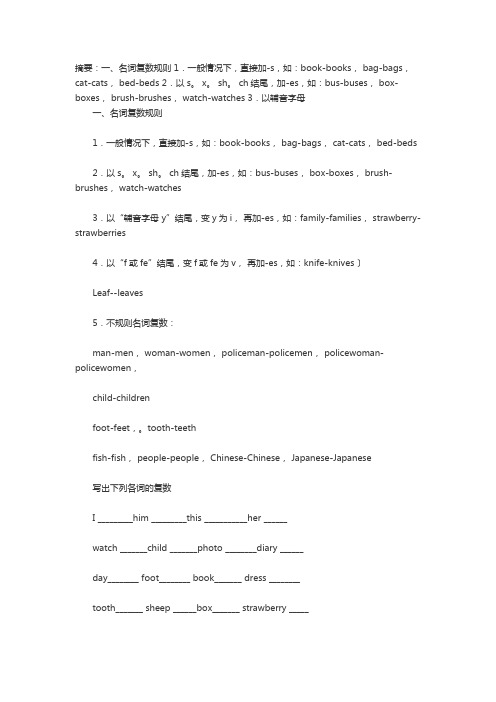
摘要:一、名词复数规则 1.一般情况下,直接加-s,如:book-books, bag-bags,cat-cats, bed-beds 2.以s。
x。
sh。
ch结尾,加-es,如:bus-buses, box-boxes, brush-brushes, watch-watches 3.以辅音字母一、名词复数规则1.一般情况下,直接加-s,如:book-books, bag-bags, cat-cats, bed-beds2.以s。
x。
sh。
ch结尾,加-es,如:bus-buses, box-boxes, brush-brushes, watch-watches3.以“辅音字母 y”结尾,变y为i,再加-es,如:family-families, strawberry-strawberries4.以“f或fe”结尾,变f或fe为v,再加-es,如:knife-knives 〕Leaf--leaves5.不规则名词复数:man-men, woman-women, policeman-policemen, policewoman-policewomen,child-childrenfoot-feet,。
tooth-teethfish-fish, people-people, Chinese-Chinese, Japanese-Japanese写出下列各词的复数I _________him _________this ___________her ______watch _______child _______photo ________diary ______day________ foot________ book_______ dress ________tooth_______ sheep ______box_______ strawberry _____peach______ sandwich ______dish_______bus_______man______ woman_______二、一般现在时一般现在时基本用法介绍【No。
小学新课标英语语法知识点

小学新课标英语语法知识点近年来,随着小学新课标的实施,英语语法的学习也成为了小学生们学习英语的重要内容之一。
在这篇文章中,我将介绍一些小学英语语法知识点,以帮助小学生们更好地掌握英语语法。
一、名词名词是表示人、事物、地点、植物等的名称。
在句子中,名词作为主语、宾语和表语等成分。
名词可以分为可数名词和不可数名词。
可数名词有单数形式和复数形式,而不可数名词没有复数形式。
例如:- 可数名词:apple (单数) - apples (复数)- 不可数名词:water (水)二、动词时态动词时态表示动作或状态发生的时间。
在英语中,常用的动词时态有三个:一般现在时、一般过去时和一般将来时。
动词的时态变化通常通过在动词原形后添加不同的词尾来实现。
例如:- 一般现在时:I play tennis.(我打网球。
)- 一般过去时:I played tennis yesterday.(我昨天打网球。
)- 一般将来时:I will play tennis tomorrow.(我明天要打网球。
)三、形容词和副词形容词用来描述名词的性质、特征或状态,而副词则用来描述动词、形容词和其他副词的性质、特征或状态。
例如:- 形容词:beautiful(美丽的)- 副词:quickly(快速地)四、代词代词用来代替名词,以避免重复使用。
常用的代词包括人称代词、物主代词和指示代词等。
例如:- 人称代词:I(我)、you(你)- 物主代词:my(我的)、your(你的)- 指示代词:this(这个)、that(那个)五、冠词冠词用来限定名词的范围,分为定冠词(the)和不定冠词(a/an)。
例如:- 定冠词:the book(这本书)- 不定冠词:a book(一本书)六、介词介词用于表示名词与其他词之间的关系,例如地点、时间、原因等。
常用的介词包括in(在)、on(在…上)和at(在…处)等。
例如:- in the park(在公园里)- on the table(在桌子上)- at school(在学校)以上是小学新课标英语语法的一些基本知识点。
强力推荐 新课标初中英语语法汇总
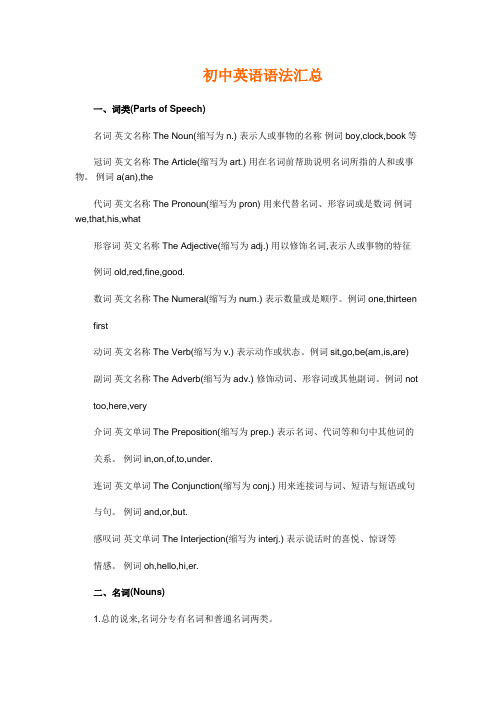
初中英语语法汇总一、词类(Parts of Speech)名词英文名称The Noun(缩写为n.) 表示人或事物的名称例词boy,clock,book等冠词英文名称The Article(缩写为art.) 用在名词前帮助说明名词所指的人和或事物。
例词a(an),the代词英文名称The Pronoun(缩写为pron) 用来代替名词、形容词或是数词例词we,that,his,what形容词英文名称The Adjective(缩写为adj.) 用以修饰名词,表示人或事物的特征例词 old,red,fine,good.数词英文名称The Numeral(缩写为num.) 表示数量或是顺序。
例词 one,thirteen first动词英文名称The Verb(缩写为v.) 表示动作或状态。
例词sit,go,be(am,is,are) 副词英文名称The Adverb(缩写为adv.) 修饰动词、形容词或其他副词。
例词not too,here,very介词英文单词The Preposition(缩写为prep.) 表示名词、代词等和句中其他词的关系。
例词in,on,of,to,under.连词英文单词The Conjunction(缩写为conj.) 用来连接词与词、短语与短语或句与句。
例词and,or,but.感叹词英文单词The Interjection(缩写为interj.) 表示说话时的喜悦、惊讶等情感。
例词oh,hello,hi,er.二、名词(Nouns)1.总的说来,名词分专有名词和普通名词两类。
专有名词: 表示具体的人,事物,地点或机构的专有名称。
Lucy China 中国Asia 亚洲Beijing 北京。
专有名词的第一个字母要大写。
普通名词: 表示某些人,某类事物,某种物质或抽象概念的名称。
例如: teacher 老师 tea 茶 reform 改革普通名词又可进一步分为四类1) 个体名称: 表示单个的人和事物。
新课标高考英语语法专题复习知识点讲解
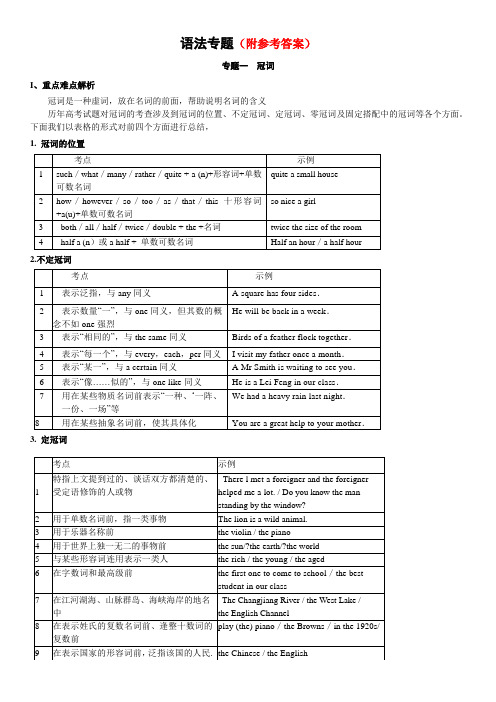
语法专题(附参考答案)专题一冠词I、重点难点解析冠词是一种虚词,放在名词的前面,帮助说明名词的含义历年高考试题对冠词的考查涉及到冠词的位置、不定冠词、定冠词、零冠词及固定搭配中的冠词等各个方面。
下面我们以表格的形式对前四个方面进行总结,1. 冠词的位置2.不定冠词3. 定冠词4. 零冠词5. 英语中含有冠词的词组辩析英语中有不少词组,从形式看好象只有冠词之差,而实际上却是意义完全不同的新词组。
1. in front of 在……(外)的前面; in the front of 在……(内)的前面There’s a garden in front of the classroom.There’s a blackboard in the front of the classroom.2. in charge of 掌管;负责; in the charge of 在……负责之下An experienced worker is in charge of the project.The project is in the charge of an experienced worker.3. at table 在用饭;吃饭时; at the table 在桌旁He seldom talks at table.They sat at the table, talking and laughing.4. by day 白天;日间; by the day 按日计He works in an office by day.Cleaning women in big cities get paid by the day.5. take place 发生;举行; take the place 代替;接替When did this conversation take place?Electric train has now taken the place of steam trains in England.6. in words 用言语; in a word 总之Please express your thought in words.In a word, I don’t trust you.7. at times 有时;不时; at a time 一次I do feel a little nervous at times.Pass me the bricks two at a time.8. little 少;不多的; a little 一些;一点点Hurry up, there’s little time left.Don’t hurry, you still have a littl e time.9. few 很少;几乎没有的; a few 有些;几个He is a man of few words.Only a few of the children can read.most interesting 非常有趣的; the most interesting 最有趣的(形容词的最高级)This is a most interesting story.This is the most interesting story of the three.doctor and nurse 一位医生兼护士; a doctor and a nurse 一位医生和一位护士A doctor and nurse is standing there.A doctor and a nurse are standing there.number of 许多;好些; the number of …(的)数目A number of students are in the classroom.The number of students in the classroom is forty.II、实战演练(一).用适当的冠词填空,不需要的划“\”., could I speak to Mr. Smith?---Sorry, wrong number. There isn't______ Mr. Smith here.2. I know you don't like _______ music very much. But what do you think of _______ music in thefilm we saw yesterday?3. --- I knocked over my coffee cup. It went right over ______ keyboard.--- You shouldn't put drinks near ________ computer.4. Of all _______ reasons for my decision to become a university professor, my father's advice was_______ most important one.5. According to _________World Health Organization, health care plans are needed in all big cities toprevent _________ spread of AIDS.6.. For him ____ stage is just ___ means of making a living.7. I think it really _______ honor for me to speak here..8. This lab used to be in _______ charge of Mr. Wang.9 I know there is ______ Mr. Smith next door, who has gone on ________ business.10 He devotes most of his time to _______ football. And I am sure he promises ________ excellentfootballer.11 Don’t lose heart. Please have ______ second try.12 Those who are rich should help ______ poor.13 When stealing the thief was caught by ______ arm by a policeman.14 In some factories workers get paid by ______ piece.15 It is a bad habit to go to work without ______ breakfast.16 John is _______ university student from ______ European country.17 Teachers play _______ active and important part in building up students’ character.18 _______ Zhangs live on the second floor.19 Cotton is grown in _______ north of China.20 It is known to us all that _______ light travels faster than _______ sound.21 A tower is seen in _______ distance.22In case of fire please press _______ red button.23 Shenzhen has ________ population of more than 10 million.24_______ days I spent with Catherine in Beijing were so wonderful.25A bullet hit the solider and he was wounded in ______ leg.26He loved writing and his first novel was ______ great success when it came out.27 My brother was born in _______ spring of 1990.28 Mr. Smith is ______ most learned scholar and you can turn to him for help.29 How sweetly she sings! I have never heard _______ better voice.30 Beijing is ______ second largest city in China.31 My trip to Tibet was really ________ unforgettable experience.32 This watch is _______ 18th century watch, which has been passed down from my great grandpa.(二)语法填空在括号中填入适当的冠词There once was a king who offered 1 prize to 2 artist who would paint 3 best picture of peace. Many artist tried. The king looked at all 4 pictures. But there were only two he really liked, and he had to choose between them.One picture was of a calm lake. The lake was a perfect mirror for peaceful high mountains all around it. Overhead wasa blue sky with fluffy white clouds. All who saw this picture thought it was 5 perfect picture of peace.The other picture had mountains, too. But these were rugged and bare. Above was 6 angry sky, from which rain fell and in which lightning played. Down 7 side of the mountain tumbled(翻腾) a foaming(水泡) waterfall. This did not look peaceful at all.But when the king looked closely, he saw behind 8 waterfall a tiny bush growing in a crack in the rock. In the bush 9 mother bird had built her nest. There, in the midst of the rush of angry water, sat the mother bird on her nest-in perfect peace.The king chose 10 second picture.答案:I 1 a 2 /; the 3 the; a 4. the; the 5 the; the 6 the; a 7 an 8 the 9 a; / 10 /; an11 a 12 the 13 the 14 the 15 the 16 a; a 17 an 18 The 19 the 20 /; / 21 the 22the 23 a 24The 25 the 26a 27the 28a 29a 30 the 31 an 32 anII 1 a 2 the 3 the 4. the 5 a 6 an 7 the 8 the 9 a 10. the专题二名词I、重点难点解析名词的高考命题导向名词的“可数”与“不可数”是高考命题的热点之一。
最新教材中的语法要点详解
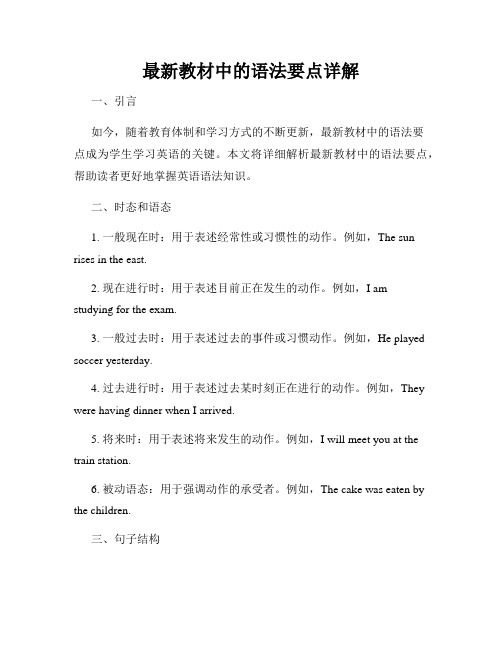
最新教材中的语法要点详解一、引言如今,随着教育体制和学习方式的不断更新,最新教材中的语法要点成为学生学习英语的关键。
本文将详细解析最新教材中的语法要点,帮助读者更好地掌握英语语法知识。
二、时态和语态1. 一般现在时:用于表述经常性或习惯性的动作。
例如,The sun rises in the east.2. 现在进行时:用于表述目前正在发生的动作。
例如,I am studying for the exam.3. 一般过去时:用于表述过去的事件或习惯动作。
例如,He played soccer yesterday.4. 过去进行时:用于表述过去某时刻正在进行的动作。
例如,They were having dinner when I arrived.5. 将来时:用于表述将来发生的动作。
例如,I will meet you at the train station.6. 被动语态:用于强调动作的承受者。
例如,The cake was eaten by the children.三、句子结构1. 主谓结构:句子中必须有一个主语和一个谓语。
例如,She sings beautifully.2. 主谓宾结构:句子中除了有主语和谓语外,还有一个宾语。
例如,He gave me a present.3. 主系表结构:句子中有一个主语、系动词和表语。
例如,She is happy.4. 并列句结构:句子中含有两个或多个并列的主语或谓语。
例如,I like apples and oranges.5. 复合句结构:句子中含有一个主句和一个或多个从句。
例如,I will go to bed early because I have an exam tomorrow.四、名词1. 可数名词:表示可以数清的事物。
例如,There are three apples on the table.2. 不可数名词:表示无法数清的事物。
新课标 初一上册英语语法点总结
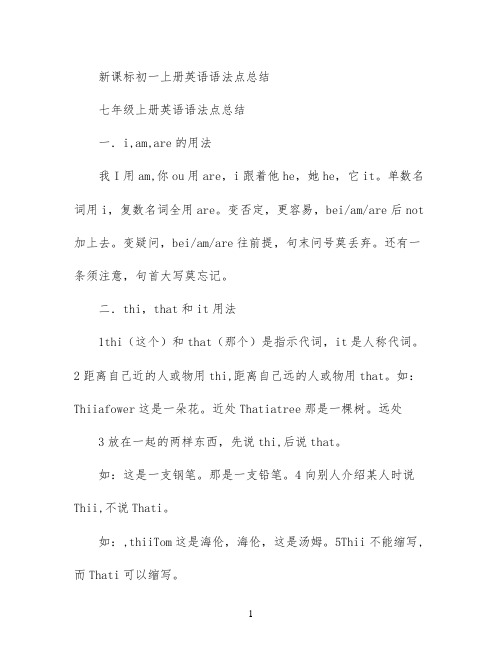
新课标初一上册英语语法点总结七年级上册英语语法点总结一.i,am,are的用法我I用am,你ou用are,i跟着他he,她he,它it。
单数名词用i,复数名词全用are。
变否定,更容易,bei/am/are后not 加上去。
变疑问,bei/am/are往前提,句末问号莫丢弃。
还有一条须注意,句首大写莫忘记。
二.thi,that和it用法1thi(这个)和that(那个)是指示代词,it是人称代词。
2距离自己近的人或物用thi,距离自己远的人或物用that。
如:Thiiafower这是一朵花。
近处Thatiatree那是一棵树。
远处3放在一起的两样东西,先说thi,后说that。
如:这是一支钢笔。
那是一支铅笔。
4向别人介绍某人时说Thii,不说Thati。
如:,thiiTom这是海伦,海伦,这是汤姆。
5Thii不能缩写,而Thati可以缩写。
如:’acar这是一辆自行车。
那是一辆轿车。
6打电话时,介绍自己用thi,询问对方用that。
如:Heo!IthatMiGreen喂,是格林小姐吗?Ye,’that是的,我是,你是谁?注意:虽然汉语中使用“我”和“你”,但英语中打电话时绝不可以说:Iam,Areou?/Whoareou而是要用Thii,Ithat 7在回答thi或that作主语的疑问句时,要用it代替thi或that。
如:①Ithianoteboo这是笔记本吗?Ye,iti是的,它是。
②What’that那是什么?It’aite是只风筝。
三.thee和thoe用法1.Thi这个,that那个,thee这些和thoe那些是指示代词,thee是thi的复数形式,指时间,距离较近的或下面要提到的人或事;thoe是that的复数形式,指时间、距离较远或前面已经提到过的人或事物。
①’bed这是我的床。
那是莉莉的床。
②Theeed→comedie5以f或fe结尾的词,先去掉f或fe,改成“v”再加enife→nive,wife→wive,handerchief→handerchieve十二时间的表达法1直读式,即直接读出时间数字A.7:05:evenfive8:16:eightiteen2过、差式,即几点差几分,几点过几分。
强力推荐 新课标初中英语语法汇编

英语语法大全初中英语语法学习提纲一、词类、句子成分和构词法:1、词类:英语词类分十种:名词、形容词、代词、数词、冠词、动词、副词、介词、连词、感叹词。
1、名词(n.):表示人、事物、地点或抽象概念的名称。
如:boy, morning, bag, ball, class, orange.2、代词(pron.):主要用来代替名词。
如:who, she, you, it .3、形容词(adj..):表示人或事物的性质或特征。
如:good, right, white, orange .4、数词(num.):表示数目或事物的顺序。
如:one, two, three, first, second, third, fourth.5、动词(v.):表示动作或状态。
如:am, is,are,have,see .6、副词(adv.):修饰动词、形容词或其他副词,说明时间、地点、程度等。
如:now, very,here, often, quietly, slowly.7、冠词(art..):用在名词前,帮助说明名词。
如:a, an, the.8、介词(prep.):表示它后面的名词或代词与其他句子成分的关系。
如in, on, from, above, behind.9、连词(conj.):用来连接词、短语或句子。
如and, but, before .10、感叹词(interj..)表示喜、怒、哀、乐等感情。
如:oh, well, hi, hello.2、句子成分:英语句子成分分为七种:主语、谓语、宾语、定语、状语、表语、宾语补足语。
1、主语是句子所要说的人或事物,回答是“谁”或者“什么”。
通常用名词或代词担任。
如:I‘m Miss Green.(我是格林小姐)2、谓语动词说明主语的动作或状态,回答“做(什么)”。
主要由动词担任。
如:Jack cleansthe room every day. (杰克每天打扫房间)3、表语在系动词之后,说明主语的身份或特征,回答是“什么”或者“怎么样”。
新课标小学语法知识总结

新课标小学语法知识总结新课标小学语法知识是小学生英语学习的重要部分,它帮助学生掌握基本的英语语言规则,为进一步学习打下坚实的基础。
以下是对小学英语语法知识的一个总结:一、名词(Nouns)- 名词是表示人、地点、事物或概念的词。
- 名词分为可数名词和不可数名词。
可数名词有复数形式,如:apple (苹果)→ apples(苹果们),不可数名词通常没有复数形式,如:water(水)。
- 名词的所有格用来表示拥有关系,如:my father's book(我父亲的书)。
二、动词(Verbs)- 动词表示行为、状态或存在。
- 动词有多种时态,如:一般现在时、一般过去时、一般将来时等。
- 行为动词根据是否需要宾语分为及物动词和不及物动词。
及物动词后面需要跟宾语,如:eat(吃)→ eat an apple(吃一个苹果)。
三、形容词(Adjectives)- 形容词用来描述名词的性质或特征。
- 形容词可以比较,形成比较级和最高级,如:big(大的)→ bigger(更大的)→ biggest(最大的)。
四、副词(Adverbs)- 副词用来修饰动词、形容词或其他副词,说明动作或状态的方式、程度等。
- 副词也有比较级和最高级,如:quickly(快地)→ more quickly(更快地)→ most quickly(最快地)。
五、代词(Pronouns)- 代词用来代替名词,避免重复。
- 代词包括人称代词、物主代词、反身代词等,如:he(他)→ his (他的)→ himself(他自己)。
六、介词(Prepositions)- 介词表示名词与句子中其他词的关系,如:in(在...里面)、on (在...上面)、at(在...地点)。
七、连词(Conjunctions)- 连词用来连接词与词、短语与短语或句子与句子。
- 常见的连词有:and(和)、but(但是)、or(或者)。
八、冠词(Articles)- 冠词用在名词前面,表示名词的特指或泛指。
强力推荐 新课标九年级英语新目标最新初中英语语法知识大全辅导

1最新初中英语语法知识大全原创(一) 形容词和副词 I . 要点(1) 形容词比较等级的用法①表示两者的比较,用形容词的比较级+than. 如: He is cleverer than the other boys.This one is more beautiful than that one.②表示两者以上的比较,用"the +形容词最高级(+名词)+of(in) …"如: He is the cleverest boy in his class.③表示两者是同等程度,用"as +形容词原级+as". 如: He is as tall as I.I have as many books as you.④ 越… 越…例如:The more I learn, the happier I am.⑤ You can never be too careful. 越小心越好又如:You can never praise the teacher too highly.你怎么赞扬这个老师也不过分。
⑥ I have never spent a more worrying day. 那一天是最令我担心的一天。
I have never had a better dinner. 这是我吃过的最好的一顿饭。
⑦ My English is no better than yours. 我的英语和你的英语都不怎么样。
例2 ____ the worse I seem to be. A When I take more medicine B The more medicine I take C Taking more of the medicine D More medicine taken解析:该题正确答案为B 。
"the+形容词比较级+… , the +形容词比较级+…"意为越…,越…。
- 1、下载文档前请自行甄别文档内容的完整性,平台不提供额外的编辑、内容补充、找答案等附加服务。
- 2、"仅部分预览"的文档,不可在线预览部分如存在完整性等问题,可反馈申请退款(可完整预览的文档不适用该条件!)。
- 3、如文档侵犯您的权益,请联系客服反馈,我们会尽快为您处理(人工客服工作时间:9:00-18:30)。
新课标英语语法大全 Document number【SA80SAB-SAA9SYT-SAATC-SA6UT-SA18】目录第一篇词法一、名词(一) 知识概要名词的概念在不同的语法教课书中有不同的解释和分类方法,但就实际应用来讲还是不要过分地追求其理论概念,而更多的要把注意力放在其应用上来。
我们不妨把它分为两大类:专有名词与普通名词。
顾名思义,专有名词是指:个人、事物、机关等所专有的名称,如,the Great Wall, America…它们是不能随意变动的。
而普通名词中则包括个体名词,如pen, worker…它表示单一的个体人或事物;集体名词,如:family,class,team,它表示的是由若干个个体组成的集合体;物质名词,如:water,paper…它表示的是一种物质,原材料;而后一种是抽象名词,如:work, time…它表示着一种在实际生活中看不见、摸不到,但却与实际生活紧密相关的某些动作、状态、品质的抽象概念。
见下表。
名词一览表种类专有名词London, John, the Communist Party of China普通名词类名词 nurse, boy, worker, pencil, dog, table集体名词 class, family, army, police, team, people物质名词 water, steel, glass, cotton, wood, sand抽象名词 happiness, love, work, life, courage, honest功用主语 My family is now in New York.表语 His father is a scientist.宾语 We love our great motherland.宾语补足语 He made London the base for his work.定语 The girls are making paper flowesrs.状语 The car cost him 1000 dollars.同位语 Mr Brown, a famous scientist, will come here.名词在使用中的难点在于名词的数,即可数名词与不可数名词的实际应用。
不可数名词不能用数字计算,所以它通常只有单数形式。
它包含有专有名词、物质名词、抽象名词等,如:English,air,water,cotton,work…可数名词是可以用数量加以计算的名词,所以它具有单数形式和复数形式两种。
可数名词复数形式的构成规律是:1. 一般情况加s,如:pen—pens, doctor—doctors,boy—boys,其读音规则是在清辅音后读[s],在元音和浊辅音后读[z]。
如:map—map , boy—boys.2. 在以s,sh,ch,x结尾的名词后面加es,如:bus—buses,class—classes,其读音为[iz]。
3. 以ce,se,ze,(d)ge结尾的名词加s,其读音为[iz]。
4. 以辅音字母加y结尾的名词,要将y变为i再加es,读作[z],如:factory—factories,country—countries, family—families.但要注意的是以元音字母加y结尾的名词的复数形式只加s,如:boy—boys,day—days。
5. 以o结尾的名词的复数形式一般要加es,但如果o前面是元音字母或外来词,缩写词以o结尾的则只加s,如:tomato—tomatoes,hero—heroes;photo—photos,radio—radios,piano—pianos6. 以f或fe结尾的名词的复数形式要将f或fe变为v再加es,如:knife—knives, leaf—leaves, 但有些例外的词如roof的复数形式是roofs。
7. 不规则名词的复数形式是要单个记忆的,它没有规律可循,如:man—men,woman—women, child—children, foot—feet,tooth—teeth, mouse—mice8. 单复同形的名词有:fish, sheep,deer…9. 单数形式但其意为复数的名词有:people,police等。
名词还有格的变化,其主格可作主语,宾格可作宾语。
还有所有格,用来表示人或物的所有,以及领属关系。
表示有生命的名词的所有格其单数形式是加's其复数形式是s',如其结尾不是s的复数形式仍加's,如:a student's room, students' rooms, Children's Day.在表示时间、距离、世界、国家……名词的所有格要用's,如:a twenty minutes' walk.但无生命名词的所有格则必须用of结构,如:the capital of our country, the colour of the flowers (二) 正误辨析[误]Please give me a paper.[正]Please give me a piece of paper.[析]不要认为可以数的名词就是可数名词,这种原因是对英语中可数与不可数名词的概念与中文中的能数与不能数相混淆了,所以造成了这样的错误,因paper在英语中是属于物质名词一类,是不可数名词。
而不可数名词要表达数量时,要用与之相关的量词来表达,如:two pieces of paper.[误]Please give me two letter papers.[正]Please give me two pieces of letter paper.[析]paper作为纸讲是不可数名词,而作为报纸、考卷、文章讲时则是可数名词,如:Each student should write a paper on what he has learnt.[误]My glasses is broken.[正]My glasses are broken.[误]I want to buy two shoes.[正]I want to buy two pairs of shoes.[析]英语中glasses—眼镜,shoes—鞋,trousers—裤子等由两部分组成的名词一般要用复数形式。
如果要表示一副眼镜应用a pair of glasses而这时的谓语动词应与量词相一致。
如:This pair of glasses is very good.[误]May I borrow two radioes[正]May I borrow two radios[析]以o结尾的名词大都是用加es来表示其复数形式,但如果o前面是一个元音字母或外来语时则只加s就可以了。
这样的词有zoo—zoos,piano—pianos.[误]This is a Mary's dictionary.[正]This is Mary's dictionary.[析]如名词前有指示代词this, that, these those,及其他修饰词our,some, every, which, 或所有格时,则不要再加冠词。
[误]There are much people in the garden.[正]There are many people in the garden.[析]可数名词前应用many, few, a few, a lot of 来修饰,而people是可数名词,而且是复数名词,如:The people are planting trees here.[误]I want a few water.[正]I want a little water.[析]不可数名词前可以用a little, little, a lot of, some来修饰,但不可用many,few来修饰。
[误]Thank you very much. Your family is very kind to me.[正]Thank you very much. Your family are very kind to me.[误]Tom's and Mary's family are waiting for us.[正]Tom's and Mary's families are waiting for us.[误]I'm sorry. I have to go. Tom's families are waiting for me.[正]I'm sorry. I have to go. Tom's family are waiting for me.[析]集合名词如果指某个集合的整体,则应视为单数,如指某个集合体中的个体则应视为复数。
如:My family is a big family. When I came in, Tom's family were watching TV. 即汤姆一家人正在看电视。
这样的集合名词有:family class, team等。
[误]Don't eat too much meats.[正]Don't eat too much meat.[误]Food in that restaurant is very good.[正]The food in that restaurant is very good.[析]物质名词是不可数名词,在使用中不可以加s,即它没有复数形式。
也不可加不定冠词。
但如果用于特指某一物质时可以加定冠词。
如:I don't like drinking coffee, but the coffee in that cup is really good.[误]Please give me two waters.[正]Please give me two glasses of water.[正]Please give me two coffees.[析]物质名词如要加计量时,一定要加量词,如:two cups of tea,two glasses of water,a glass of milk,a loaf of bread,a piece of bread,a box of sugar,a bowl of rice,a bottle of orange,a bag of earth例: I'll tell you a piece of good news.但只有coffee可以用coffees来取代many cups of coffee.[误]Can you give me the newspaper of today[正]Can you give me today's newspaper[析]加's构成所有格的名词一般应指有生命的人或物。
